|
Can a person file a complaint of sexual harassment anonymously under POSH?
Yes. The POSH Act allows a person to file a complaint of sexual harassment anonymously. The act allows this to protect the identity of the person making the complaint. This can help the complainant to feel more secure in making the complaint, especially in cases where the complainant may be concerned about victimization. Anonymity can also encourage more people to come forward and report incidents of sexual harassment, which can help to create a safer and more respectful workplace for everyone. The POSH Act recognizes the need for confidentiality in such cases, and complainants have the option to request the ICC not to reveal their identity during the inquiry. However, it is essential to note that submitting an anonymous complaint may affect the credibility of the complaint and investigation. This may limit the ICC's ability to gather evidence and conduct a thorough investigation.
0 Comments
In our company, we have ten male employees and no female employees. Is it necessary to constitute an Internal Committee under the POSH Act, 2013?
→Yes. →If a workplace does not have any female employees, it is still necessary to constitute an Internal Committee (IC) under the Prevention of Sexual Harassment (POSH) Act, 2013. →The POSH Act mandates that every workplace with ten or more employees, regardless of gender composition, must establish an IC to address and prevent sexual harassment in the workplace. Can an employer forfeit the gratuity payable to an employee terminated on the grounds of sexual harassment of a woman?
YES. Under the Payment of Gratuity Act 1972, an employer must pay gratuity to an employee who has completed at least five years of continuous service with the company. Sexual harassment can be considered a form of moral turpitude. On the ground of moral turpitude, in the above case, the gratuity payable to the employee may be forfeited. Moral turpitude refers to conduct contrary to the accepted rules of morality and involves dishonesty, fraud, or other forms of depravity. The aggrieved woman requested the Internal Committee (IC) of POSH to allow Advocate to represent in the inquiry process. Is this valid?
→NO. →As per the POSH Act, 2013, both the parties to the complaint are not permitted to bring their Advocates/Legal Practitioners to participate in the IC Inquiry Process. The Company formed the Internal Complaints Committee (ICC) to meet the requirements of the POSH Act - 2013, but it did not include an external member. In this situation, is the committee valid?
NO. As per the POSH Act of 2013, every ICC must include at least one external member who is not associated with the organization or does not work in the same industry. A supervisor complains to HR that one of the female team members is often idle in her workstation without performing the assigned tasks. HR asked him to provide proof for the same. To provide evidence, the supervisor took a photo of the female team member while she was not working at her workstation. The female team member objected to the supervisor's act and reported as sexual harassment to the IC. Is it valid?
→The complaint is not valid as the POSH Act, 2013 defines sexual harassment as any unwelcome physical, verbal, or non-verbal conduct of a sexual nature that could create an intimidating, hostile, or offensive work environment. →The points because the complaint is not valid are:
Can ICC forward sexual harassment complaint to the police without the consent of the aggrieved woman?
→No. →Under the POSH Act, 2013, the Internal Complaints Committee (ICC) cannot forward a complaint of sexual harassment to the police without the consent of the aggrieved woman. →The ICC is responsible for investigating complaints of sexual harassment and making recommendations for appropriate action within the organization. →The ICC may refer a complaint to the police when a settlement has been agreed upon between the parties, but the respondent has failed to comply with the settlement terms. →It is important to respect the confidentiality and privacy of the aggrieved woman during the ICC's proceedings and to ensure that her consent is obtained before taking any further action. The HR manager tells the aggrieved woman not to complain to the ICC about sexual harassment and that he will handle it. Is it valid?
No. It is not valid for the HR Manager to tell an aggrieved woman not to give a complaint to the Internal Complaints Committee (ICC) and that he will handle it himself.
Annual Report must be submitted by January every year to the District Officer nominated by the appropriate government.
Sec.16: Notwithstanding anything contained in the Right to Information Act, 2005, the contents of the complaint made under section 9, the identity and addresses of the aggrieved woman, respondent and witnesses, any information relating to conciliation and inquiry proceedings, recommendations of the Internal Committee or the Local Committee, as the case may be, and the action taken by the employer or the District Officer under the provisions of this Act shall not be published, communicated or made known to the public, press and media in any manner.
Sec.15: The IC shall have regard to •••
Sec.14 authorises the employer to take appropriate disciplinary action against the complainant in line with the service rules/ standing orders of the Company.
NO: The Employer may accept or may not, but so such modifications or alterations or suggest the IC to modify etc are not permissible. The Employer, on receipt of the report, shall act upon the recommendation within sixty days of tis receipt by him.
Sec.13 (3) of the Act provides: That report of the Committee shall have to be deemed as equally as enquiry report in a domestic enquiry. It has to be treated as finding in disciplinary enquiry.Finding and report of the IC shall not be treated as a mere preliminary investigation but a finding in enquiry. Saritha Verma Vs New Delhi Municipal Corporation.2016 LLR 785.Del.HC. WHETHER THE IC CAN RECOMMEND ANY PUNISHMENT AND OR ANY AMOUNT TO BE PAID TO THE AGGREIVED WOMEN?3/2/2023
YES: The IC can recommend suitable punishment in line with the standing orders / service rules/ discipline policies of the Company. The IC can not suggest a particular punishment since it is not under their jurisdiction. The IC is empowered to find the respondent guilty or not guilty. Further, the IC is empowered to suggest a particular amount to be paid to the complainant to be deducted from the salary of the respondent as a relief. Provided that in case the employer is unable to make such deduction from the salary of the respondent due to his being absent from duty or cessation of employment, it may direct the respondent to pay such sum to the aggrieved woman. And further that in case the respondent fails to pay the sum, the Internal Committee can take up with the concerned District Officer to recover the sum as a debt and pay to the aggrieved women.
YES: She can seek transfer to different location of work, or grant special leave for three months. The Employer should consider her request and depending on the situations, reliefs to be provide under Sec.12.
YES: A compliant can be filed. She can take the assistance of IC Members as well. The proceedings before the Magistrate and the enquiry before the IC are independent & even if the charges are not proved before the Court, this has no effect on the findings of IC.
YES: Under Sec.10 [1], the IC my suggest whether the complainant is agreeable for a conciliation so that the matter may be mutually settled, but no monetary compromises. In case, the complainant is acceptable and a settlement is reached, the report may be sent to the Employer. Otherwise, the process of enquiry starts.
It is the responsibility of the IC Members to understand the status of the aggrieved women and even during cross examination, the IC members can collect the list of questions by the respondent & elicit answers separately and record the same. IC Members need to balance the emotions & reactions by both the parties.
An Enquiry under this Act by IC is not a preliminary one, but a full-fledged enquiry of fact finding. IC has to conduct the enquiry for proving the misconduct in terms of service rules or standing orders thereof a domestic enquiry. IC has to fully comply with principles of natural justice.
The Enquiry must be conducted on the same lines of conducting a “Domestic Enquiry”. Strictly in conformity with the principles of natura justice and follow “Procedural Proceedings”, Examination & cross examination, documents, and no proceedings to be conducted in the absence of the Complainant as well as the respondent.
It is the key responsibility of the Employer to conduct training sessions to acquire the skills & knowledge to conduct the proceedings of the enquiry for all the IC members. Ability to create an enabling meeting environment, use body language that communicates, complete attention to the parties, treat the complainant with respect, discard pre-determined ideas& determine the harm to the aggrieved. During a redress process the Internal Committee is required to assure confidentiality, no- retaliation and recommend interim measures as needed to conduct a fair inquiry.
Dealing with workplace sexual harassment complaints is often complex. Must possess the following.
At least 3 IC members to be present to carryon with the enquiry. Chairperson must be present. No enquiry to be held in the absence of the Chairperson.
YES: A fearless environment, confidentiality, support in case the aggrieved wishes to lodge an FIR with the police, a patient hearing to present his case in a non-biased manner, frankness, create mutual trust in eliciting the circumstances and situations that led to the case. May be even, one to one talk.
First step is the IC must study and conduct its own enquiries and discussions with the complainant to ensure that it is a matter of sexual harassment. Because not all the complaints will be sexual harassment.
Following judgement is the judicial view: “All unwelcome physical contact will not sexual harassment. Compliant & accused both were working in same establishment. Accused entered the Lab room of complainant, snatched the material in the hands of the complainant, threw the material and pushed her out of room. Complainant took this as an unwelcome physical contact and amounted to sexual harassment. The Complaint Committee enquired into the complaint and concluded that it was a case of altercation in the background of uncongenial environment prevailing there and it was not a sexually determined behaviour .The High Court upheld the decision of the CC.” Shantha Kumar Vs CDIR &othrs.2018 LLR 8Del.HC. |
Categories
All
Prevention of Sexual Harassment at Workplace (PoSH)50,000 HR PROFESSIONALS ARE CONNECTED THROUGH OUR NIRATHANKA HR GROUPS.
YOU CAN ALSO JOIN AND PARTICIPATE IN OUR GROUP DISCUSSIONS. |

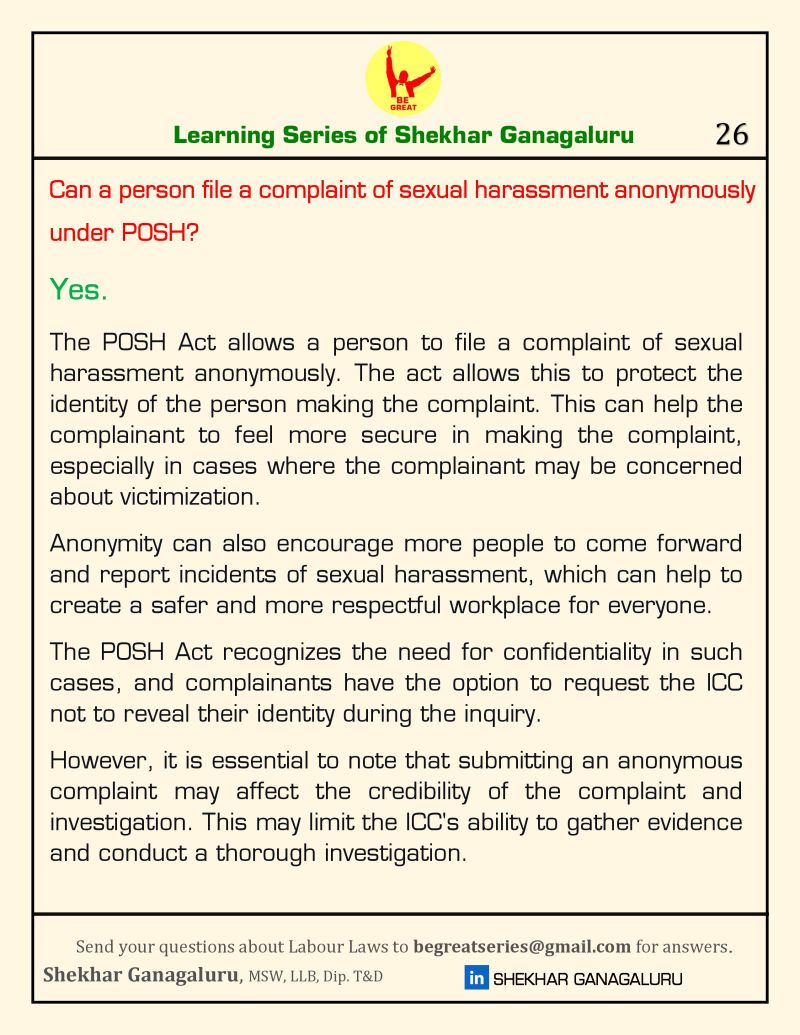
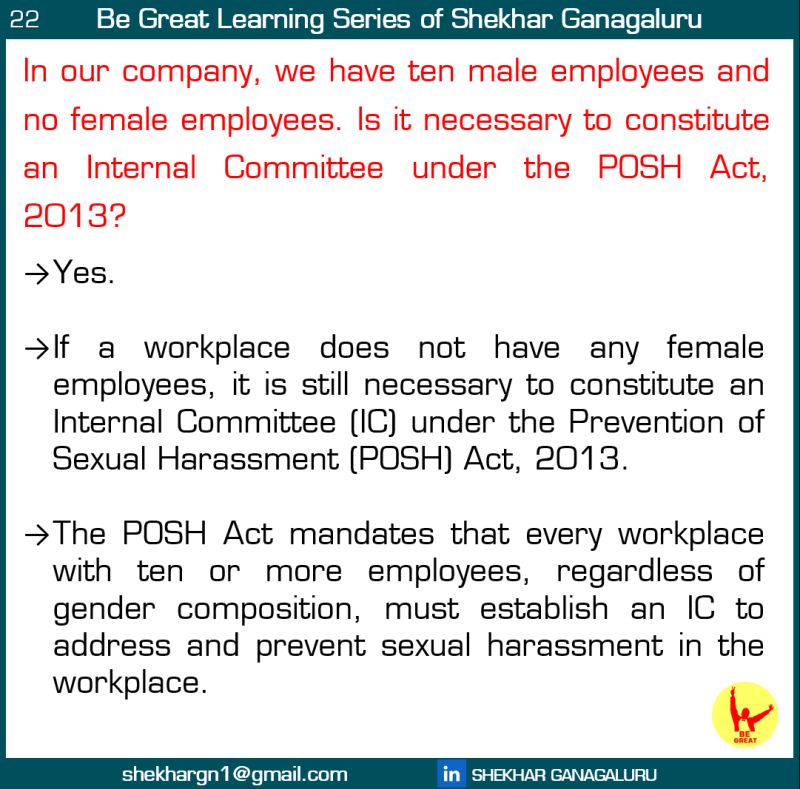
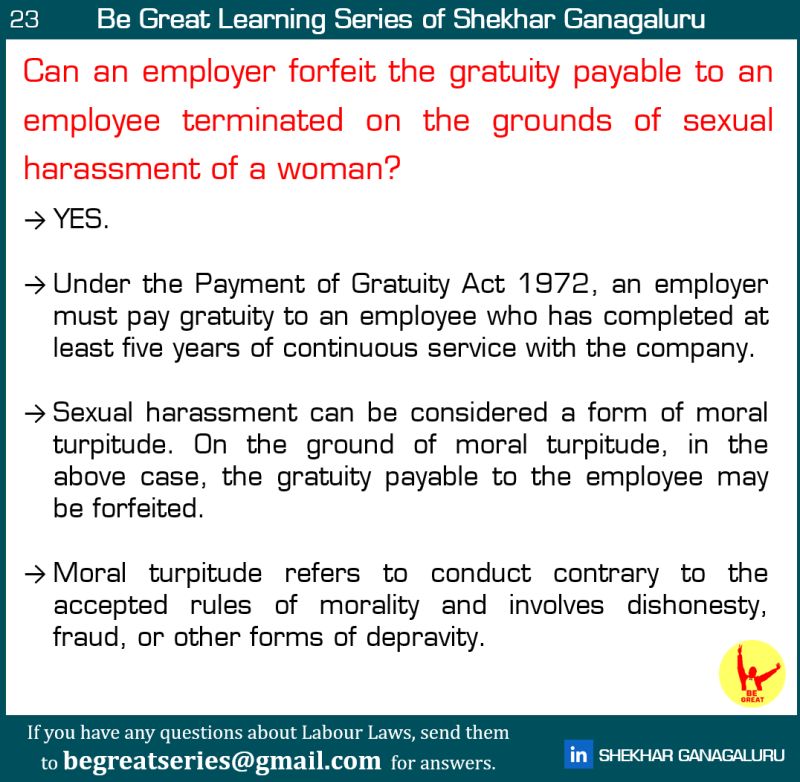
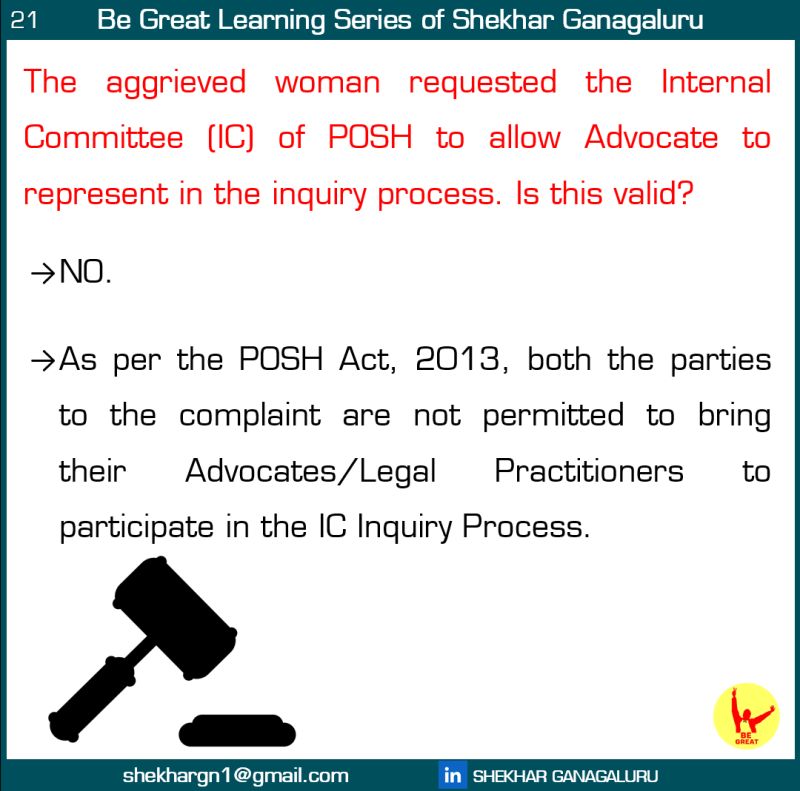
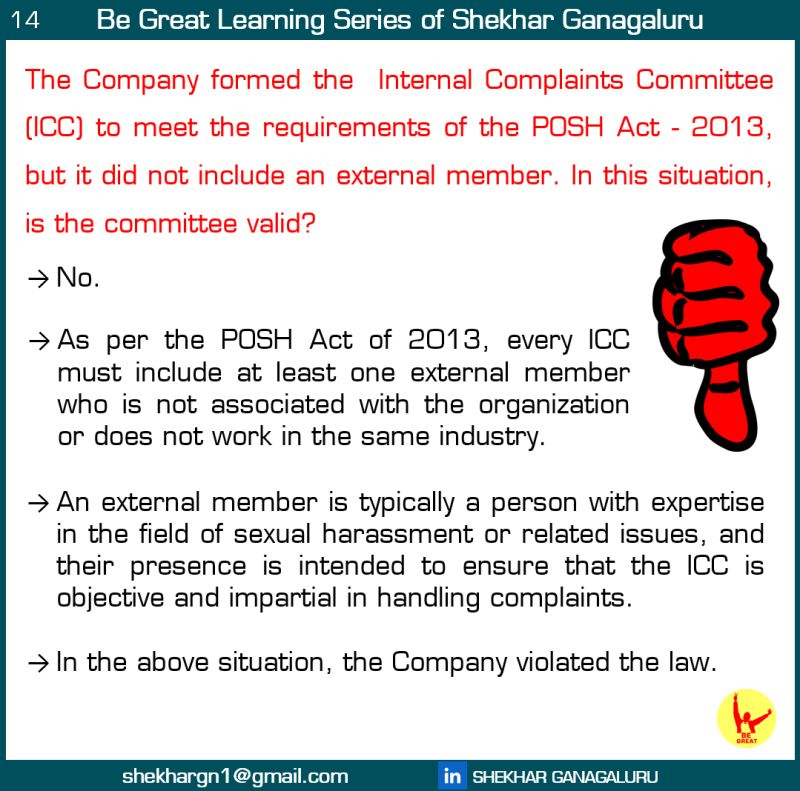

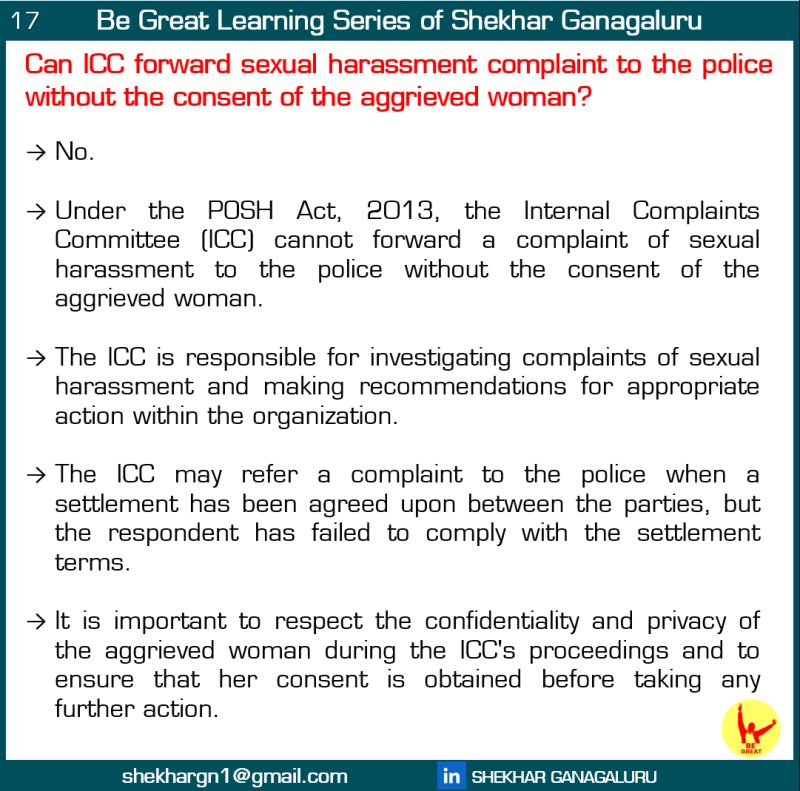
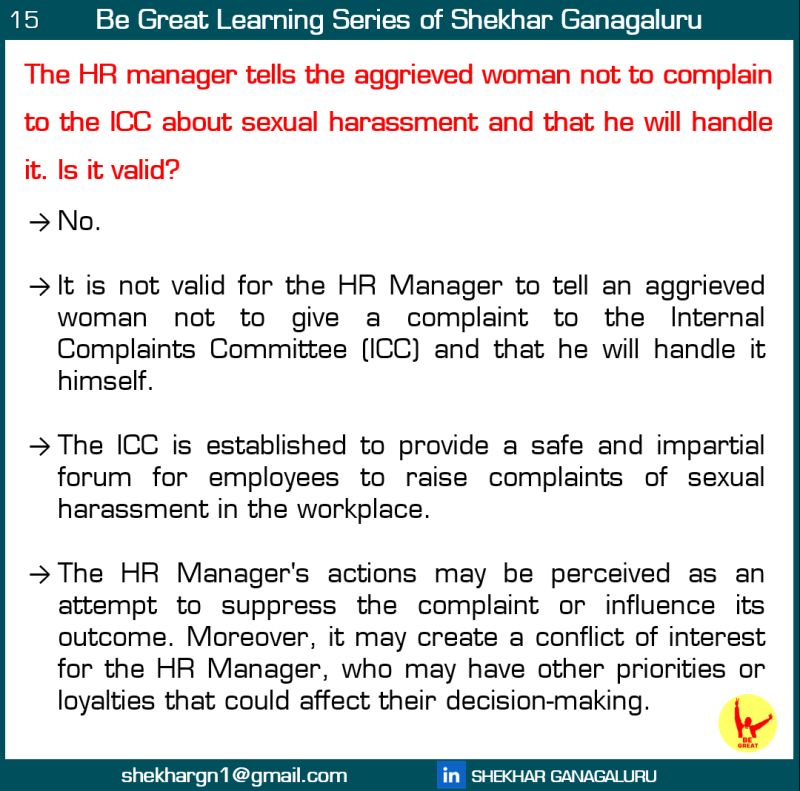








 RSS Feed
RSS Feed




